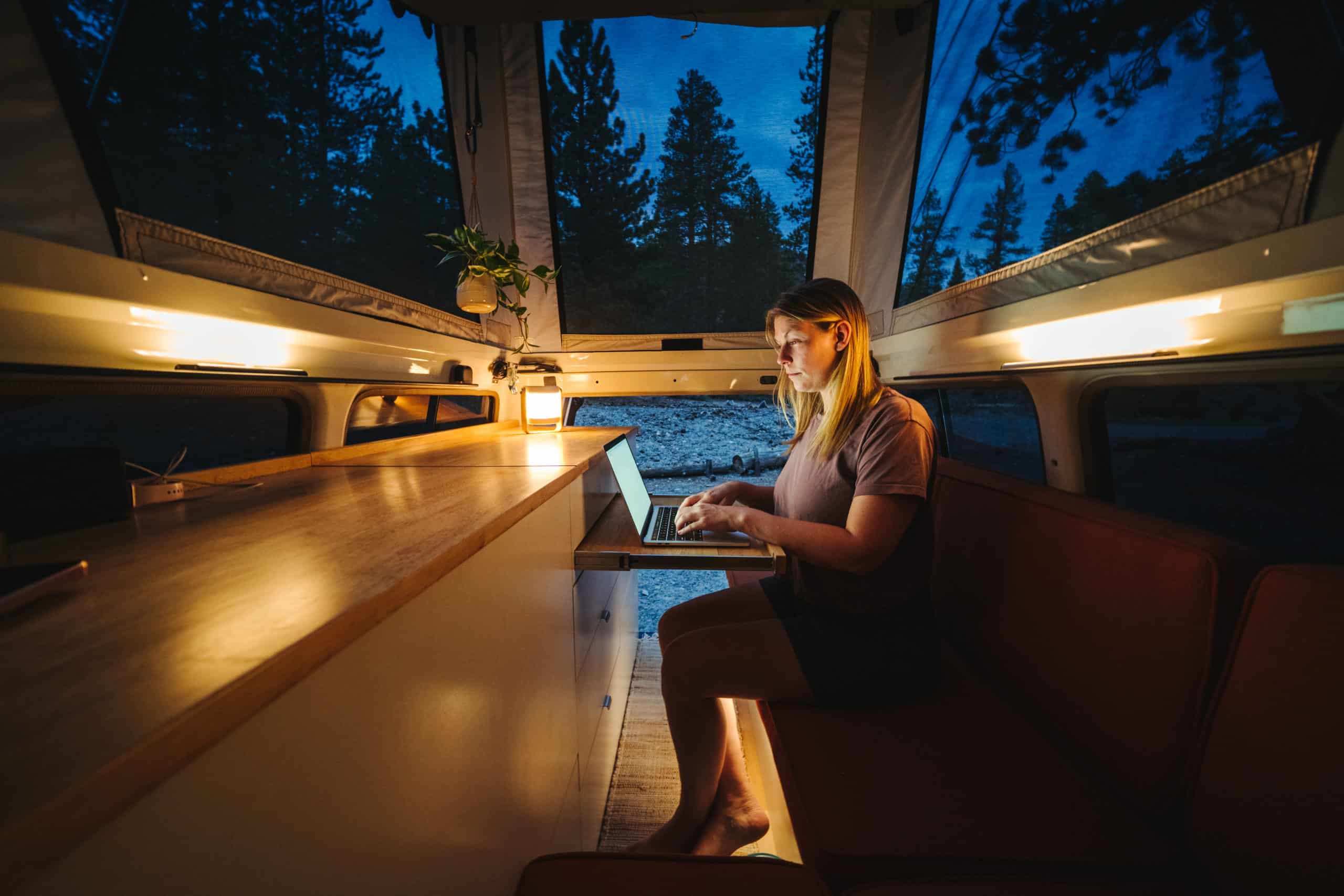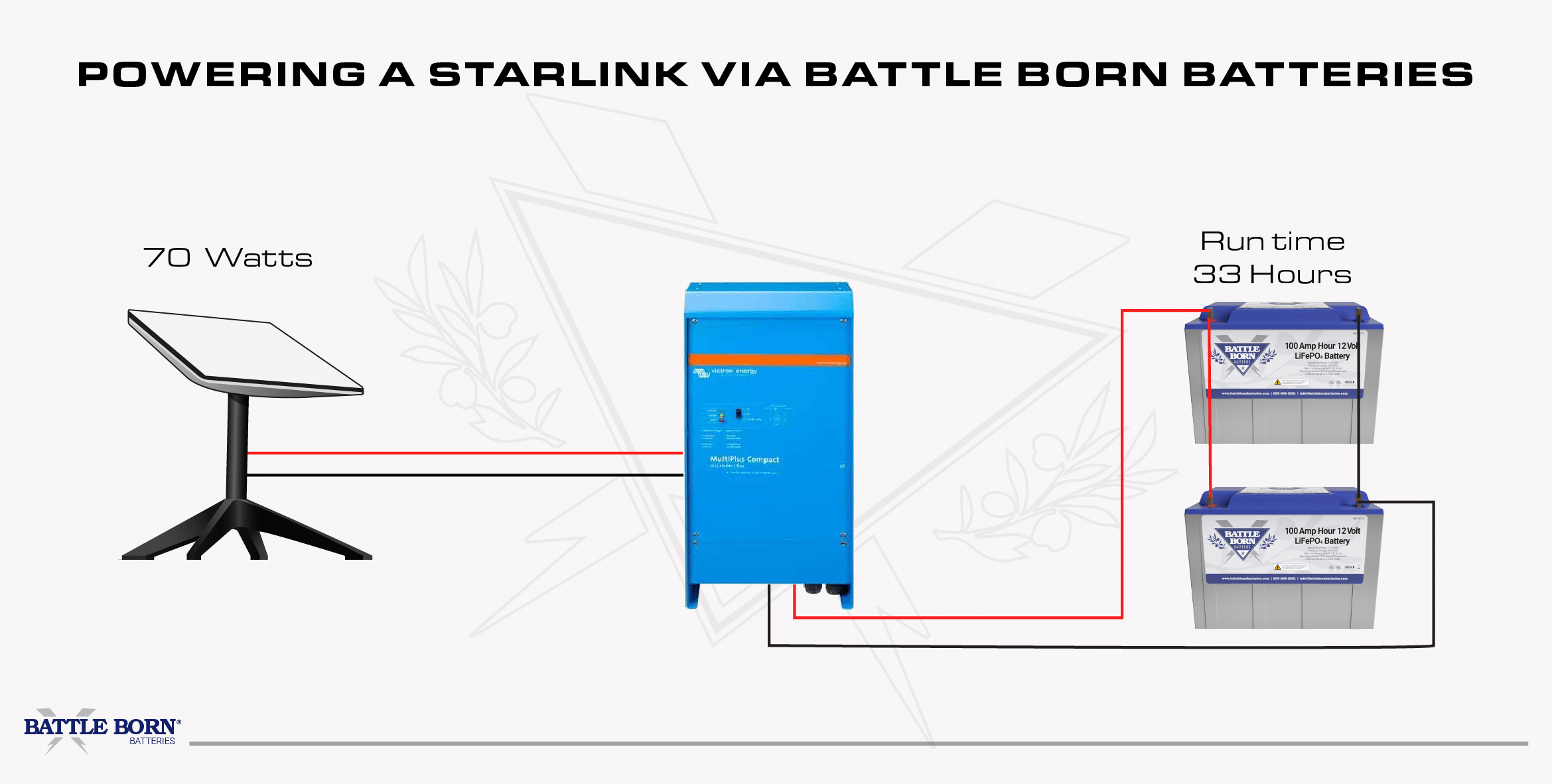
MENUMENU
TALK TO AN EXPERT
Special Hours: 7AM – 6PM PST
TALK TO AN EXPERT
Special Hours: 7AM – 6PM PST
As nomads, having reasonably priced satellite internet to take on the road or across the ocean is a dream. Introducing Starlink.
Starlink is a global network of satellites orbiting low around the Earth that provides fast and reliable internet. It can support activities like streaming, gaming, and video calls. Starlink uses advanced technology in satellites and user hardware to deliver high-speed internet and low delay to people everywhere–the prospect of high-speed, unlimited internet in the most remote areas. In the end, has it been worth the wait?

Most satellite internet services use a single geostationary satellite that orbits the Earth at a distance of 35,786 km. This results in high latency, which makes it difficult to support high data rate activities such as streaming, online gaming, and video calls.
Starlink is specifically designed to provide fast and reliable satellite internet connectivity to all parts of Earth. The system comprises thousands of satellites that orbit the Earth at a distance of 550 km, nearly 60x closer than the traditional satellite. Because of the lower orbit, latency is significantly lower, improving the internet’s quality and speed.
Starlink internet coverage has been growing at an incredible rate. The final goal is to have a “constellation” of 40,000 satellites in orbit to provide internet connectivity to every part of the world. Starlink systems work by covering most of North America, Europe, Australia, and South America.
The folks over at When Sailing have confirmed that Starlink works in “Guadeloupe, Antique, Barbuda, St Barths, and the ocean in between without losing the connection.”
Starlink is quickly becoming a popular option for those seeking high-speed internet while on the road or traveling by boat. While there are many advantages to using Starlink, it’s important to also consider the potential downsides as well.
The major first advantage is obvious; it offers unlimited internet and works in remote places. The solution is cheaper than constantly changing carriers and has a simple plug-and-play setup. Additionally, customer service has a reputation for being customer oriented.
On the downside, Starlink could be more expensive than a single, local carrier if you are posted up in one location for a while. It is not always available in rural areas, and expensive equipment fees exist.
It’s also worth noting that the start-up process can take up to 15 minutes, which might be a big inconvenience for some users. And Starlink’s biggest potential downfall? The amount of power it uses. If you haven’t made the upgrade powerful and reliable lithium-ion batteries yet to complement a Starlink system, now would be the time! But more about that is below.
Starlink offers two internet connectivity options: the Flat High-Performance Starlink for in-motion use and the Standard Starlink for portable use at any destination. Let’s take a closer look at each option.
The Flat High-Performance Starlink is a game-changer for those who need consistent internet connectivity while in motion. With enhanced GPS capabilities and a wide field of view, the Flat High-Performance Starlink can connect to more satellites, providing high-speed, low-latency internet on the go. Designed for permanent installation on your vehicle, it’s resilient in harsh environments and offers reliable internet connectivity anywhere you go. This option is currently available for order and use in select markets. This is one of the best options for an RV and is commonly referred to as the “RV Dish.”
The Standard Starlink is the way to go if you need portable internet access. With an easy setup and breakdown, the Standard Starlink delivers high-speed, low-latency internet access within minutes and packs up quickly when it’s time to move to your next destination. This option is not designed for in-motion use.
The Standard / Residential Starlink Dish is the second version of the Starlink Base Dish, designed for portability. It is mainly used on sailboats because of its availability and because you can use it with an RV subscription.
For those who need internet connectivity across regions or even continents, Starlink Roam is the perfect solution. Available for land use within your continent (under a regional plan) or across the globe (under a global plan), Starlink Roam can be ordered in any country where Starlink is available.
And finally, the Maritime version is meant for commercial boats or big yachts. Besides the more extensive hardware, the hefty ticket price of 10K installation and 5K monthly subscription tells you it’s not meant for single households.
The Starlink Kit is a package that includes a few things and makes setting up a new Starlink system fairly straightforward. The main part is a dish called “Dishy McFlatface” (Yes, this is actually what SpaceX calls it … “Dishy” for short.), which connects to the internet through satellites. The kit also has a stand to hold up the dish and some wires to connect everything together.
The dish is already set up and connected to the power and internet when you get the kit. All you need to do is take the dish out of the box, put it on the stand outside where it can see the sky, plug it into the power, and use a phone app to set up the Wi-Fi name and password. Then the magic happens, and you can use the internet!
While the setup is relatively simple, many resources exist for specific setups on different applications to help out any Startlink users. We recommend TucksTruck.com for overland vehicles and RVs. He offers a comprehensive breakdown of the installation and solutions to common problems. Nomadic Moments also has some great tips for a truck install.
For Maritime installation, When Sailing has a great, in-depth review regarding using Starlink on a sailboat and installation tips. Sailing Koinoia hasn’t used their Starlink abroad but does have some great tips for solving common installation problems.
Starlink Subscription options provide an excellent solution for households with multiple devices requiring high-speed internet or for marine and van life. What sets Starlink apart from other internet providers is its no-contract option, which allows customers to cancel the service at any time without penalty. Moreover, if you cancel within 30 days and return the equipment in good condition with the original packaging, you will receive a refund on your equipment fee.
But that’s not all–Starlink offers many other benefits, including no cancellation fees, a $99 deposit for a waitlist, an easy setup process using a mobile app, and satellites designed to keep space clean by deorbiting when they are no longer operational.
Starlink internet plans offer comprehensive and affordable options for high-speed internet, with three plans to choose from: Starlink, Starlink RV, and Starlink Business. Depending on your desired download speed, these plans offer speeds ranging from 50 to 500 Mbps at prices ranging from $110 to $500 per month. Starlink RV and business customers can pause and restart their service anytime, making it a flexible option for those frequently on the go.
If you have decided to make the jump to lithium batteries? Brandon Newman, and expert Battle Born Technical Specialists answered a few questions about the setup.
“When you consider the power needed for your Starlink setup, include all the components you will want to run on your setup. This includes things such as TVs, computers, a fridge, coffee makers, etc. When calculating your electrical needs, you’ll need to be mindful of running times and energy use for all appliances.”
For the average user, Starlink runs on about 70 watts of power. If you want to run the internet system for 24 hours, it will consume 140Ah. Put simply, two 100Ah 12V Battle Born Batteries would power the 70-watt Starlink for roughly 33 hours. You want to remember that you will also need to use an inverter because it is 120 volts.

You have a few options for recharging your setup. If you want to boondock somewhere, fill the roof with solar. This will require a solar charge controller, calculated based on the amount of solar panels you install in your system. You also have the option to charge with an alternator. A DC to DC charger provides a regulated charge while driving.
From boat to van to RV, you have many different options for setting up your system. Posting up in sunny places will allow you to run your Starlink mainly off your panels. Running it mainly during the day can help you save in the long run. However, connecting your solar with lithium batteries is a great way to stay connected! Spend your days outside and your evenings working with the power of lithium batteries. With the right equipment and quality products, your system will run efficiently for a long time.
Shop Best Sellers








Ask a technical specialist now at 855.292.2831
Stay in the Know
5 thoughts on “Is Starlink Worth The Hype?”
Starlink is great we use it all the time, camping all over the Midwest and on the gulf coast. I nice to take your streaming channel with you when you head out. We use the RV version and pause it during the months we are not using it. Give it a try. I know you will enjoy being connected as you roam all over this great nation.
I’ve been considering investing in Starlink but am still unsure about the hype surrounding it. What are your thoughts on its potential and long-term viability?
I installed starlink for a customer of mine that was tired of her regular ISP letting her down. She lives in a remote part of Virginia so after doing some research, she decided to give starlink a shot. Personally, I had never installed starlink before, but to be honest, setup was super easy. The app tells you exactly how to get going step by step and she was linked up to a satellite within minutes of powering it up. I put it on her roof on a wooden platform I built(hated to drill into her roof even though they provide silicone to cover the bolts once it’s attached). That was about two months ago and she rarely looses connectivity. I was so impressed by it I bought one myself! lol… Seriously, it’s worth the price. I have yet to try it because I haven’t needed it, but I will use it when I travel. Hope this helps some of you who may come across this. And by the way… she uses starlink as her primary ISP. That’s how good it is. Cheers!
Great insights on Starlink! It really made me think about the trade-offs between cost and speed, especially for those in rural areas. I’m curious to see how it evolves in the coming years as more satellites are launched. Thanks for breaking it down!
Great insights! I’ve been curious about Starlink for a while now, and your analysis really helped clarify its pros and cons. I appreciate the breakdown of performance and pricing—definitely something to consider before making a switch. Thanks for the detailed review!